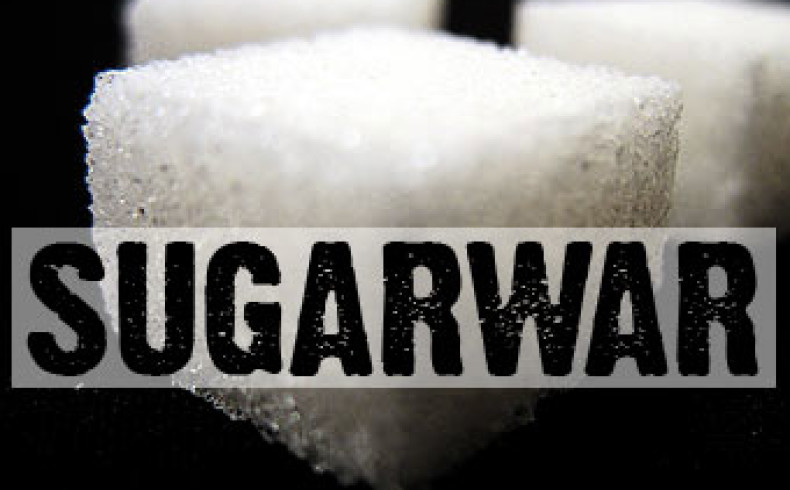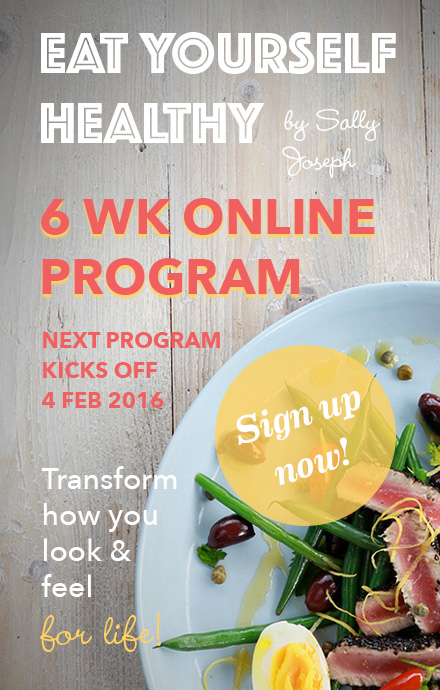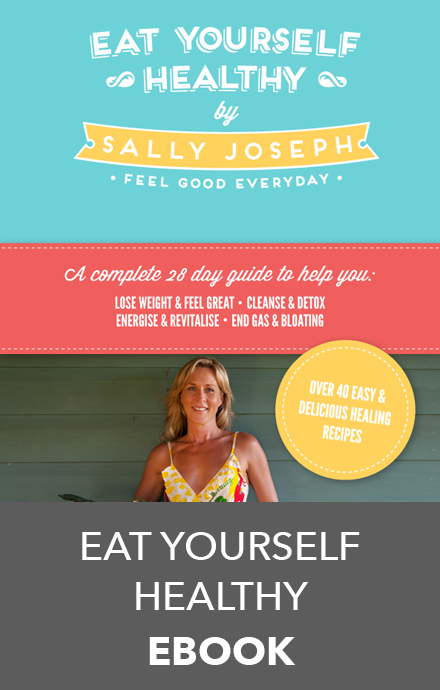
Just a few days after returning from my travels in America, my PA flicked me no less than 96 emails from my readers asking my opinion on a recent ‘sugar war’ that had broken out between a journalist and a nutritionist. I read the article in question and was some what amused as these sorts of controversies always seem to come round when the latest health craze is hitting the streets. So I feel compelled to respond to those who have asked about my stance on this argument, not only because so many of you have requested I clear up the confusion, but also because Sarah Wilson was a client of mine, when she consulted me back in 2006 for advice on her auto immune illness, Hashimoto’s. The advice I gave her back then, was the same advice she recommends in her I Quit Sugar plan and adheres to personally, so naturally I sit more in the ‘to quit’ camp, than the ‘not to quit’ camp.
I also explained to Sarah the underlying driving force behind ANY auto immune disease, ( or any illness or chronic health issue for that matter) is INFLAMMATION, and that sugar and gluten impact on the immune system, a little like the effect of lighting a match and throwing it into a drum of oil – they trigger a metaphorical fire within the body.
This inflammatory response starts in the gut, where 80% of our immune system resides. But aside from the inflammatory action sugar and gluten have on the body’s immune system, there is also the fact they are highly fattening. (I’ll go into how gluten can contribute to the body laying down fat in another post and focus on sugar for now). Contrary to popular belief it’s the intake of too much sugar that is fattening, NOT foods containing fat, (with the exception of processed fats such as vegetable oil).
Sugar becomes fattening based on the body’s response to the TYPE of sugar and HOW MUCH we eat. You see, there are different types of sugar and this is where the ‘to quit or not to quit’ sugar message get’s confusing. So let me spell it out simply for you….
Fructose – is the sugar found in every thing from whole fruit, fruit juice, to honey ( 40%) , agave ( 97%), maple syrup (40%), coconut sugar (40 – 50%) and of course worst of all – the processed sugars – high fructose corn syrup which is THE MOST FATTENING FORM OF ALL. Fructose is fattening because it does not stimulate insulin secretion from our pancreas ( like glucose does). So when we consume foods and beverages that contain fructose, 100% of the fructose component is converted directly to fat, unlike glucose, which the body will use for energy production in the first instance and then convert the unused portion, or surplus to fat.
The confusion around fructose is that many people get confused thinking it is a “natural,” sugar because it’s contained in fruit, and then assume all fructose products are ok. But the amount of fructose in fruit compared to processed forms of fructose is a lot less, especially if you stick to the low sugar fruits such as berries, limes, lemons, grapefruit, kiwi, and sour plums. What’s more fruit also contains good sources of vitamins, minerals, phytochemicals, and fibre, unlike processed forms of fructose.
However, in the case where someone is very overweight, heavily addicted to sugar or insulin resistant, I actually recommend these folk initially either avoid all fruit (other than lemons), for the first 3 – 4 weeks in order to re-sensitise their body to insulin again and stimulate their fat burning mechanism. Or at the very least, avoid the high sugar fruits (grapes, bananas, mangos, sweet cherries, apples, pineapples, and pears), until their weight starts to normalize and their sugar cravings subside.
And in case you’re worried about the loss of nutrients from cutting out fruit for any period of time, or limiting it to just the low sugar fruits for any period, as long as you are eating a wide range and plenty of vegetables, then you will be getting all the nutrients found in whole fruit.
As for dried fruits I say it’s a big no, no except for a few goji berries added to some raw, mixed nuts, because dried fruit is especially high in sugar. People who have a bad case of Candida overgrowth are another group I recommend to avoid of all fruit and others sugars in order to bring it under control, along with specific herbal supplements.
What about natural sugars?
As for sources of ‘natural’ fructose found in varying quanties like honey, maple syrup, agave, rapadura or coconut palm sugar ( NOT to be confused with palm sugar) whilst these still contain various nutrients, IF they are raw or processed on low heat, they still contain fructose and in the case of agave – up to 97% ( I shake my head in dismay at how many nutritionists and raw foodies are still recommending this VERY high fructose sugar) and coconut sugar is effectively made of 70%-80% sucrose (table sugar) which contains 50% fructose! So as you can see, just because a sugar is ‘natural’ or less processed, does not mean it doesn’t conatin fructose and eaten in excess is still fattening. ‘How much’ of these sugars one can eat, is the question and that is what varies from person to person, depending on what your underlying health is like or what your weight is. In my opinion, the nutrients found in some of these ‘natural, unprocessed sugars above are all found in other foods, that don’t contain the fructose, so you really don’t need to rely on them for this.
If we ate fructose only in fruit and occasionally honey and rice malt syrup, (which is my preferred sugar because it contains no fructose), like our primal ancestors did, the body would easily process it and we would not experience the problems associated with sugar intake today.
Glucose
Another type of sugar is glucose, the most common form of carbohydrate, derived from starches. When you eat starchy foods like grains – such as pasta and rice or root vegetables, lentils and legumes, your body will convert them into glucose. Unlike fructose, glucose will stimulate an insulin response to transport the glucose from the blood stream to the cells for energy. Insulin is also a storage hormone, so any left over glucose will be converted for long-term storage in the form of fat. It’s only the cells that actually need glucose that have insulin receptors so that the glucose can be delivered to them.
The negative effects of glucose arise when our glucose intake is continuously high. Eating lots of high glucose containing foods like processed foods and white flour, white rice, pastry etc, or foods containing straight sugar, cause a sharp spike in blood glucose levels. Our pancreas can only handle small amounts of glucose, so if we overload it with too much glucose, we will end up over producing insulin which is not only highly inflammatory but can also trigger insulin resistance. This can result in diseases such as type 2 diabetes or metabolic syndrome as well as cause heart disease.
Take Home Message on glucose: Your body will take up the glucose it needs and eating excess levels of high starch foods and simple sugars will not only cause your body to lay the excess down as fat, but also trigger chronic inflammation and insulin resistance – resulting in numerous health problems and diseases.
As for an explanation as to why the nutritionist whose hair supposedly fell out when she quit sugar, and now recommends we ‘don’t quit sugar’, my opinion as a Nutritionist who specialises in treating thyroid and auto immune conditions, this condition is usually associated with auto immune thyroid diseases, or in extreme cases of hair loss – Alopecia so her hair loss could have been induced by the stress of an extreme shift in her blood glucose levels, if she deprived her body of all sugar and carbohydrates – something I don’t recommend. In cases of hypoglycaemia – low blood sugar levels, I recommend supplementing with minerals such as magnesium, chromium or lipoec acid to regulate healthy blood glucose and insulin responses.
You can find all the juicy details on my stance on sugar and other foods I recommend you avoid to lose weight and stave off disease, including down regulating auto immune responses and food intolerances, in my book eat yourself healthy In 28 days It contains a comprehensive chart on all foods, detailing how much of which foods I recommend you eat the most of, which to moderate your intake of and those to avoid, as well as an initial detox program to alkalise your body and cleanse your liver and bowel to put a stop to all that excess gas and bloating! If you have been thinking about doing a detox before summer, then now is the time because you join me as I undertake my detox program, starting this Saturday and go into the draw to win a healthy pantry starter pack worth over $150. *See terms and conditions below for details.


Health & Lifestyle Tips
Delicious Healthy Recipes
Educational & Recipe Videos









This is an incredible reference thanks Sally, and really echoes my own opinion. Thank you!
This is an incredible reference thanks Sally, and really echoes my own opinion. Thank you!
Thanks Natasha, I just felt that article was really irresponsible for a Nutritionist to send that message, so I wanted to set the record straight as a qualified Nutritionist and as someone who has advised Sarah. x
Thanks Natasha, I just felt that article was really irresponsible for a Nutritionist to send that message, so I wanted to set the record straight as a qualified Nutritionist and as someone who has advised Sarah. x
Great article Sally, thanks for clearing this up. I have Sarah Wilson’s book and when I read the journalist’s article, it was so confusing. You are always providing the right guidance for a healthy lifestyle.